Nunca intentes averiguar cómo están relacionados dos personas en una familia árabe a menos que estés preparado para escuchar una larga y detallada lección de genealogía que de alguna manera abarca múltiples generaciones y al menos tres primos. Un simple "tío" o "primo" nunca es suficiente: cada respuesta viene con un breve resumen del árbol genealógico, y para cuando terminan, es posible que ya hayas olvidado por qué preguntaste en primer lugar. 😅
En la cultura árabe, la familia no se trata solo de parientes cercanos; es una red vasta e interconectada donde todos parecen conocerse entre sí, o al menos pretenden hacerlo. 🙂 Los lazos familiares no son solo biológicos; forman una estructura social que influye en las relaciones e interacciones. Importa si alguien está relacionado por el lado materno o paterno, si es mayor o menor, y esto se refleja en los términos precisos utilizados para dirigirse a ellos. Por ejemplo, los términos para "tío" y "tía" son mucho más específicos que en muchos otros idiomas, variando según el lado de la familia del que provengan y su posición en la jerarquía familiar. El respeto por los mayores es especialmente importante, por lo que un hermano menor incluso puede ser llamado "Pequeño Padre" (Abu X), o un hermano mayor puede recibir un título que signifique honor y estatus.
Si quieres aprender la madre en árabe y el padre en árabe, lo mejor es comenzar con lo básico. Madre en árabe es أم (Umm), mientras que padre en árabe es أب (Ab). A partir de ahí, se despliega todo un sistema donde cada pariente tiene un nombre específico según su lugar exacto en la familia. Si tienes curiosidad por saber cómo los árabes se refieren a sus familiares—y quieres evitar llamar accidentalmente “tío” a un desconocido—¡sigue leyendo! 😃
If you want to deepen your knowledge of Arabic, try the PixiLearn Arabic learning app, where you can learn Arabic words and phrases in a fun and interactive way. Download it now and start learning! Learn Arabic words with PixiLearn
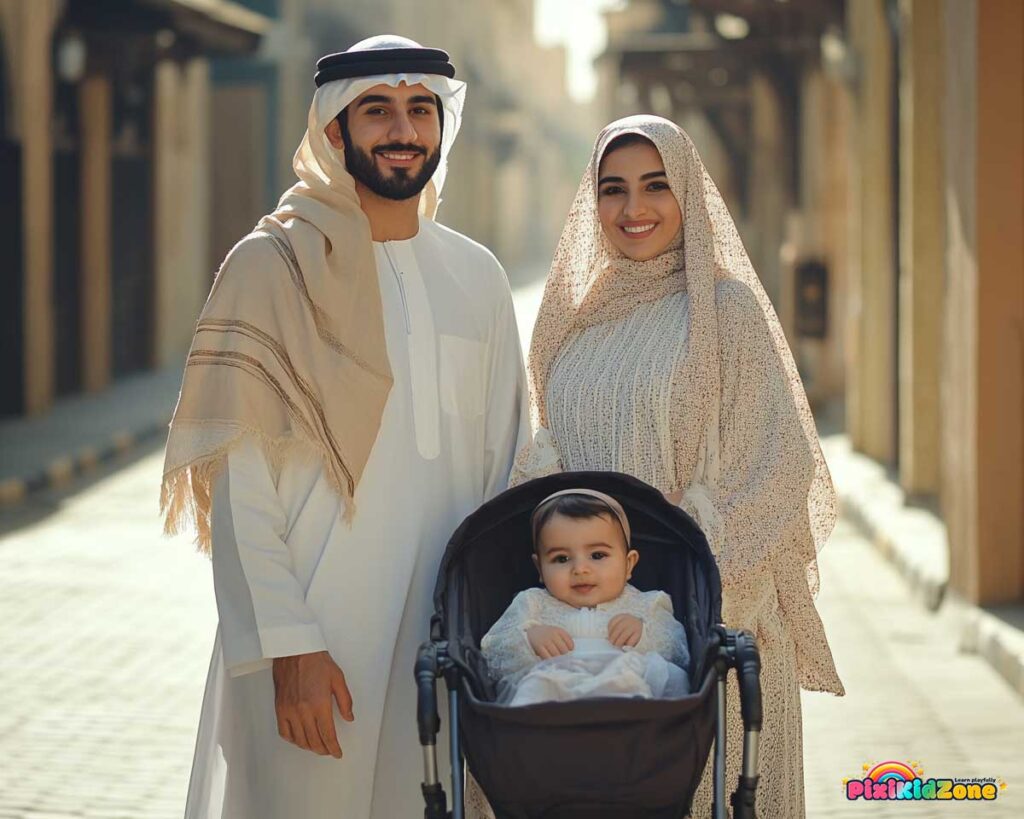
Madre en árabe y Padre en árabe
Madre en árabe – أم (Umm)
En árabe, la palabra para madre es أم (Umm), y se pronuncia como “Omm”.
Las madres ocupan un papel central en la cultura árabe, siendo a menudo consideradas el corazón de la familia. El idioma árabe refleja este profundo respeto a través de títulos afectuosos como “Umm + nombre del primogénito”, donde a veces se llama a una madre por el nombre de su hijo mayor, como Umm Ahmed (madre de Ahmed).
Padre en árabe – أب (Ab)
La palabra en árabe para padre es أب (Ab), y se pronuncia como “Ab”.
En la cultura árabe, los padres son tradicionalmente vistos como la cabeza del hogar, responsables de la orientación y el apoyo. Al igual que las madres, los padres también reciben títulos honoríficos, comúnmente “Abu + nombre del primogénito”, como Abu Khalid (padre de Khalid), simbolizando su papel y estatus dentro de la familia.
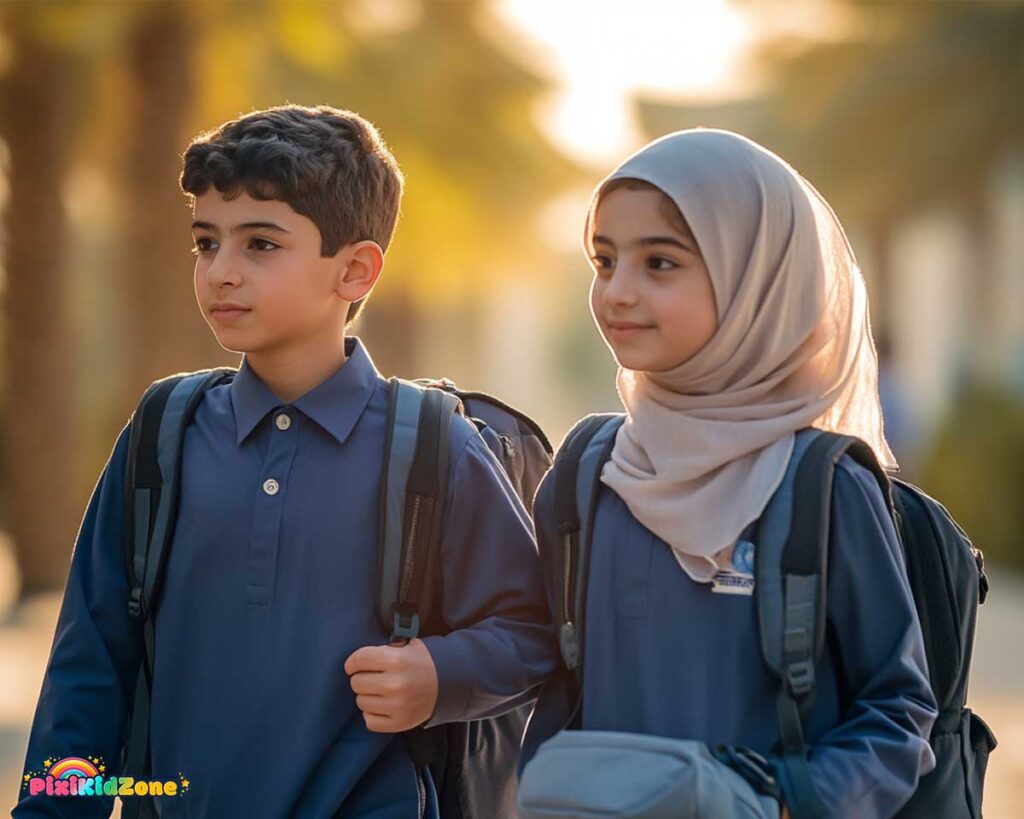
Hijo en árabe y Hija en árabe
Hijo en árabe – ابن (Ibn)
En árabe, la palabra para hijo es ابن (Ibn), y en ciertos dialectos se pronuncia como “Ibn” o “Bin”.
El término Ibn no solo se usa en conversaciones familiares cotidianas, sino que también aparece en contextos históricos y formales, como en nombres (por ejemplo, Ibn Sina, que significa Hijo de Sina). En la sociedad árabe tradicional, los hijos suelen ser vistos como portadores del apellido y el legado familiar.
Hija en árabe – بنت (Bint)
La palabra en árabe para hija es بنت (Bint), y se pronuncia como “Bint”.
A diferencia de Ibn, que a menudo se usa en nombres completos, Bint aparece en referencias genealógicas, como “Bint Ali”, que significa Hija de Ali. Históricamente, el término se utilizaba en familias nobles para resaltar la ascendencia. En muchos hogares árabes, las hijas ocupan un lugar especial y suelen recibir apodos cariñosos.
Arabic Word for Brother and Sister
Brother in Arabic – أخ (Akh)
In Arabic, the word for brother is أخ (Akh), pronounced as “Akh” (with a soft “kh” sound, like the German “Bach”).
In Arab culture, the bond between siblings is highly valued. An older brother (Akh Kabeer – أخ كبير) often takes on a protective and guiding role within the family, while younger brothers (Akh Sagheer – أخ صغير) are expected to show respect and follow their elders’ advice.
Sister in Arabic – أخت (Ukht)
The Arabic word for sister is أخت (Ukht), pronounced as “Ukht”.
Sisters hold a special place in Arab families, often taking on nurturing roles. An older sister (Ukht Kabeera – أخت كبيرة) is traditionally viewed as a second mother, offering guidance and care, while younger sisters (Ukht Sagheera – أخت صغيرة) are usually pampered and protected by their siblings.
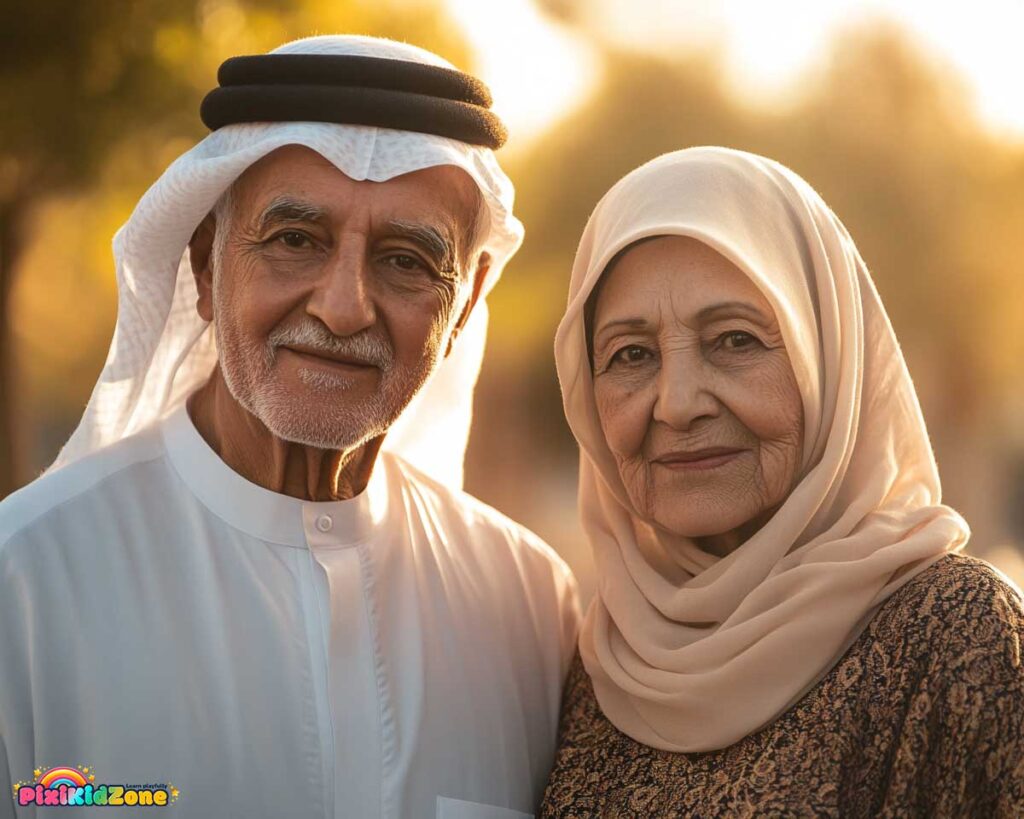
Arabic Word for Grandfather and Grandmother
Grandfather in Arabic – جد (Jadd)
In Arabic, the word for grandfather is جد (Jadd), pronounced as “Jadd”.
Grandfathers are highly respected in Arab families, often seen as the family’s wisdom keepers. They play an important role in passing down traditions, stories, and values. In some regions, affectionate terms like “Jiddi” (جدي) or “Sidi” (سيدي) are used to address grandfathers, reflecting deep respect and closeness.
Grandmother in Arabic – جدة (Jadda)
The Arabic word for grandmother is جدة (Jadda), pronounced as “Jadda”.
Grandmothers are often the heart of the household, known for their hospitality and love, especially when it comes to cooking! In some dialects, grandmothers are lovingly called “Teta” (تيتا) or “Jiddati” (جدتي). Their role extends beyond the family, as they often serve as the unifying force keeping multiple generations connected.
Arabic Word for Uncle and Aunt
Uncle in Arabic – عم (Am) / خال (Khal)
In Arabic, there are two different words for uncle, depending on whether he is from the father’s or mother’s side:
- عم (Am) – Paternal uncle (father’s brother), pronounced as “Am”
- خال (Khal) – Maternal uncle (mother’s brother), pronounced as “Khal”
Uncles often play a significant role in Arab families, acting as second fathers. The عم (Am), being from the father’s side, is often seen as an authoritative figure, while the خال (Khal) is traditionally known for being more affectionate and easygoing.
Aunt in Arabic – عمة (Amma) / خالة (Khala)
Just like with uncles, Arabic distinguishes between aunts from the paternal and maternal sides:
- عمة (Amma) – Paternal aunt (father’s sister), pronounced as “Amma”
- خالة (Khala) – Maternal aunt (mother’s sister), pronounced as “Khala”
Aunts, especially maternal ones (Khala), often take on a nurturing and caring role in a child’s life. The “Khala” is sometimes considered a second mother, while the “Amma” can hold a more traditional role within the extended family structure.
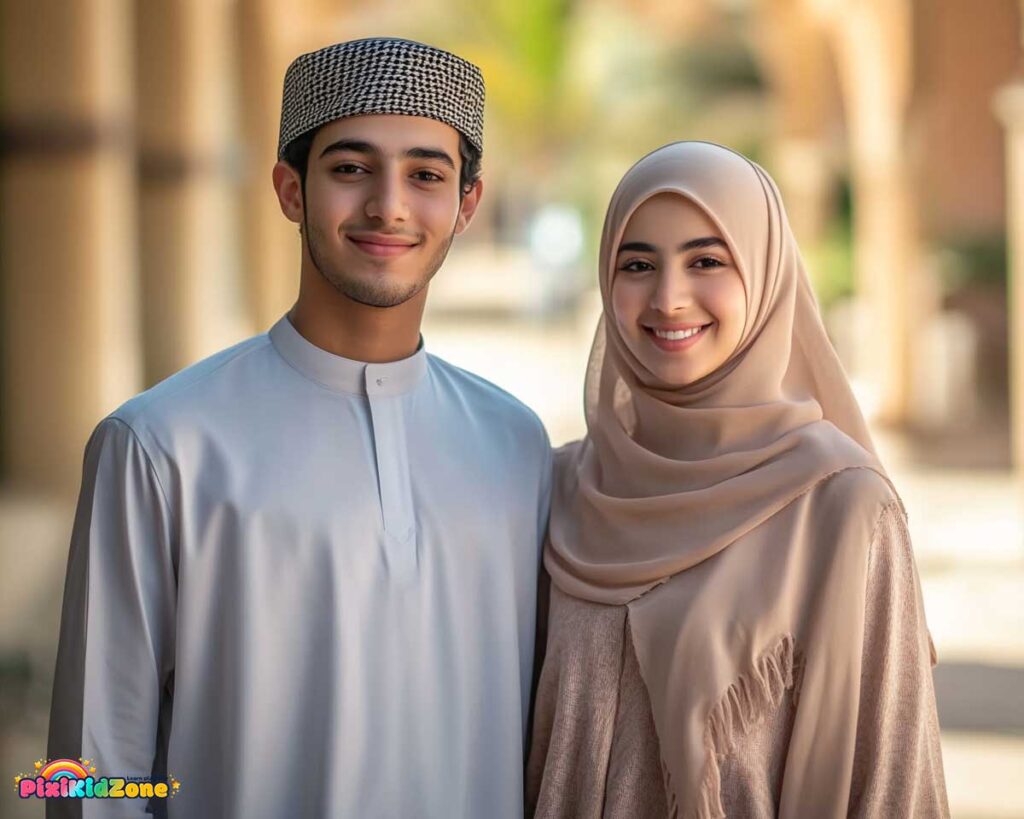
Arabic Word for Cousin (Male and Female)
Male Cousin in Arabic – ابن عم (Ibn Am) / ابن خال (Ibn Khal)
In Arabic, the word for male cousin depends on whether he is from the father’s or mother’s side:
- ابن عم (Ibn Am) – Paternal cousin (father’s brother’s son), pronounced as “Ibn Am”
- ابن خال (Ibn Khal) – Maternal cousin (mother’s brother’s son), pronounced as “Ibn Khal”
Cousins in Arab families are often as close as siblings, and in some cases, they even grow up together. Historically, in many Arab cultures, paternal cousins (especially Ibn Am) were considered potential marriage partners due to strong family ties and traditions.
Female Cousin in Arabic – بنت عم (Bint Am) / بنت خال (Bint Khal)
Similarly, the word for female cousin also changes depending on which side of the family she is from:
- بنت عم (Bint Am) – Paternal cousin (father’s brother’s daughter), pronounced as “Bint Am”
- بنت خال (Bint Khal) – Maternal cousin (mother’s brother’s daughter), pronounced as “Bint Khal”
Female cousins share a special bond in Arab families, often being treated as sisters. Just like with male cousins, Bint Am was traditionally seen as a close family connection, sometimes even a future spouse in arranged marriage traditions. However, in modern Arab society, cousin relationships are more about family unity and lifelong friendships.
Arabic Word for Grandson and Granddaughter
Grandson in Arabic – حفيد (Hafeed)
In Arabic, the word for grandson is حفيد (Hafeed), pronounced as “Hafeed”.
Grandsons hold a special place in Arab families, often being cherished and spoiled by their grandparents. In many cases, grandparents play an active role in raising and mentoring their grandsons, passing down traditions, stories, and wisdom.
Granddaughter in Arabic – حفيدة (Hafeeda)
The Arabic word for granddaughter is حفيدة (Hafeeda), pronounced as “Hafeeda”.
Granddaughters are equally adored, often receiving special attention from their grandmothers, who teach them family traditions, cooking secrets, and cultural values. In some Arab families, the first granddaughter even takes on a special role as the “little queen” of the household, bringing joy to everyone.
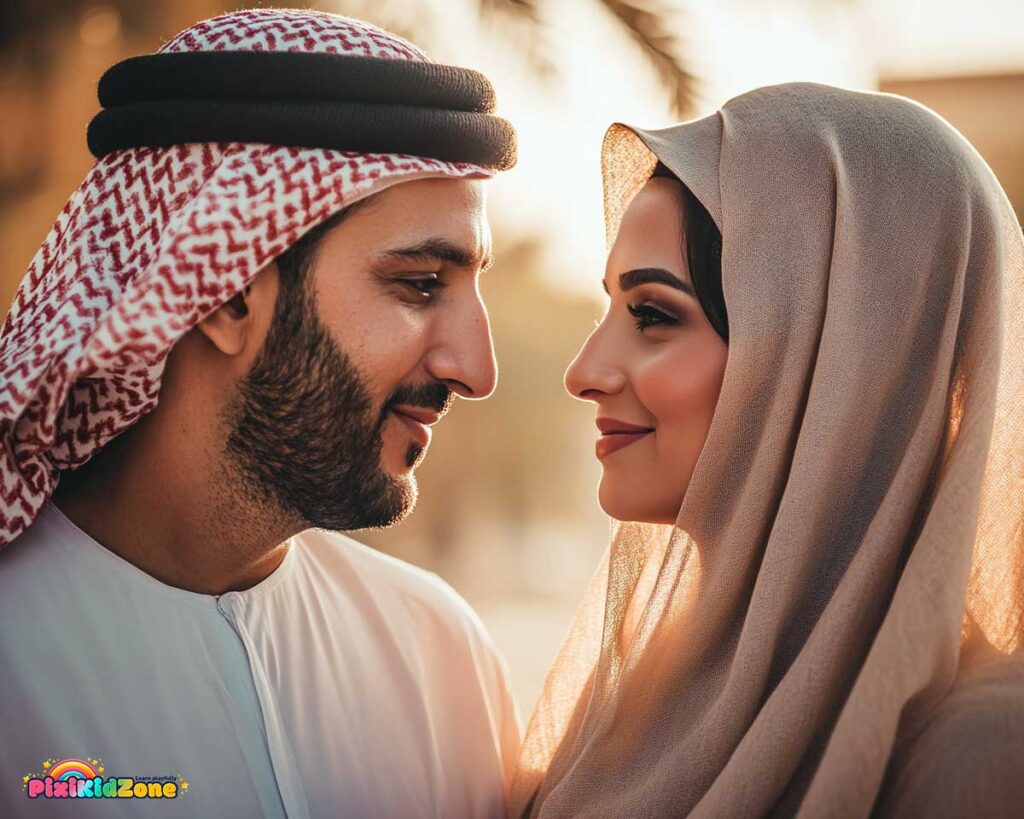
Arabic Word for Husband and Wife
Husband in Arabic – زوج (Zawj)
In Arabic, the word for husband is زوج (Zawj), pronounced as “Zawj”.
Marriage is highly valued in Arab culture, and the role of a husband extends beyond being a life partner—he is traditionally seen as the provider and protector of the family. The word “Zawj” can also mean “pair” in Arabic, emphasizing the idea of partnership and unity in marriage.
Wife in Arabic – زوجة (Zawja)
The Arabic word for wife is زوجة (Zawja), pronounced as “Zawja”.
Wives in Arab families hold an essential role, often seen as the heart of the home. In many traditional settings, the wife is responsible for maintaining family bonds, raising children, and preserving cultural traditions. The word “Zawja” comes from the same root as “Zawj”, reinforcing the idea that husband and wife are two halves of a whole.
Now You Know How to Address Someone in Arabic!
Learning Arabic family terms is not just useful for language learning—it’s a real cultural gateway. In Arab families, kinship ties mean much more than just blood relations—they shape social interactions, forms of respect, and even daily greetings.
If you ever visit an Arab family, you won’t be surprised to find that uncles and aunts have different specific titles, or that “Abu” and “Umm” (Father and Mother) are often followed by the name of their firstborn child. And if you ever ask, “How are these two related?”, you’ll quickly realize that it’s best to sit down and grab a notebook.
Now that you know the most important Arabic family words, maybe it’s time to try using them in a conversation. Who knows? The next time an Arab grandmother smiles at you, you might just know exactly how to address her. 😉
¿Ya has leído estos?
¿Quieres aprender más sobre el árabe egipcio? ¡Descubre qué idioma hablan realmente los egipcios! https://pixikidzone.com/es/blog/speak-the-egyptian-language-but-wait-what-language-do-they-actually-speak/
¿Tienes curiosidad por saber cómo preguntar “¿Cómo estás?” en árabe? ¡Aprende las formas más educadas! https://pixikidzone.com/es/blog/arabic-for-how-are-you-learn-how-to-ask-politely/
¿Alguna vez te has preguntado sobre las palabrotas en árabe? ¡Descúbrelas desde el dialecto marroquí hasta el del Golfo, con pronunciación! https://pixikidzone.com/es/blog/swear-words-in-arabic-from-moroccan-to-gulf-with-pronunciation/

 Español
Español



 English
English 简体中文
简体中文 Deutsch
Deutsch Português
Português Magyar
Magyar Русский
Русский Français
Français हिन्दी
हिन्दी العربية
العربية











